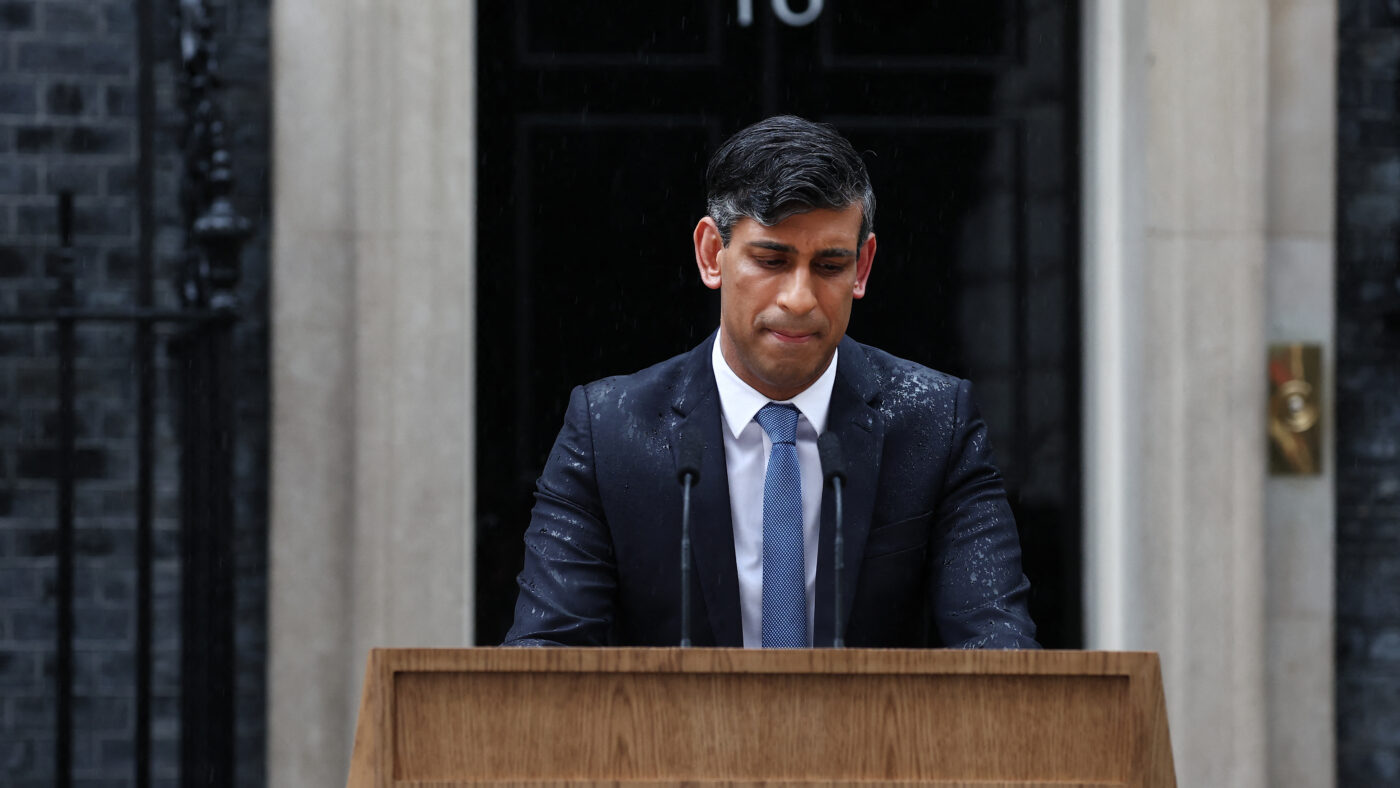In the words of Sir Humphrey Appleby: ‘Very courageous, Prime Minister.’ Rishi Sunak sends the Conservatives marching towards the sound of gunfire and a deficit in the opinion polls that most pundits suspect will be almost impossible to overcome. The debilitating narrative of drift and ‘clinging to office’ was clearly setting in.
Thus we have the gutsy decision to resolve the matter. Some felt the optics of the announcement were less than ideal. The Prime Minister being drenched in Downing Street while battling to be heard above music blasted out by protestors gave a beleaguered feel. I wonder if that will have done him any harm. He is the underdog so he might as well embrace the role. At least it contrasted with the image of a pampered out-of-touch elitist.
Perhaps the election timing was inspired by Pedro Sánchez, the socialist Prime Minister of Spain. He called an election last July when he was behind in the polls and before he needed to. The boldness was rewarded with an unexpected, albeit very narrow victory.
All general elections come down to the rival campaigns of ‘safety first’ or ‘time for a change.’ Despite the turbulence of recent years, some may think that keeping Rishi Sunak would be a safe option. Not transformational. No sunlit uplands. But technocratic competence with some reforms here and there.
A bit too ‘safe’ some Conservatives may feel. They would prefer to have a bolder and more radical approach to such issues as cutting tax, tackling illegal immigration and taking advantage of the opportunities that Brexit offers. That these issues should be faced up to rather than delayed. Many of these disillusioned Conservatives are currently planning to abstain on July 4, or vote for Reform UK as a protest. The Tories’ manifesto will have to give conservative reasons to vote Conservative.
But mostly, the general election will be a referendum on the Labour Party. Voters have made up their minds about the Conservatives. They are dissatisfied with them but not alarmed. They will start off minded to accept the ‘time for a change’ message but not quite resolved to do so – certainly not with any enthusiasm. The focus will be on whether Labour can be trusted and some attempt to discover just what the change will be.
Labour will be seeking to reassure that there won’t be too much change. It does make for a certain lack of clarity. You can almost here it now: ‘Vote for change but also stability.’ ‘The Tories have disastrous policies. We pledge to continue with them.’ That may work. The voters may feel that if the policy offer is much the same then it’s only fair to give the other lot a turn running things.
The challenge for the Conservatives is to highlight the risks. They have some powerful evidence. First of all, less than five years ago Keir Starmer was campaigning for Jeremy Corbyn to become Prime Minister. Starmer was not just doing so as a Labour MP but as a member of Corbyn’s Shadow Cabinet. Then, even after the general election, he was still presenting himself as a Corbyn loyalist to win election as Labour leader.
There are also plenty of issues where Starmer has issued a pledge and then promptly ditched it – as and when it proved expedient to do so. Sometimes he will switch back and forth. On Brexit, he said we must carry it out, then that we must overturn the result with a second referendum, then that we must accept it after all.
Starmer is not the first politician whose words might be regarded as unreliable. But he does have an exceptional amount of form. The other difficulty is that the public may be less indulgent towards him than others as they don’t warm to his personality. Boris Johnson had that roguish charm when he was busking it. Tony Blair had plenty of charisma and that grin that told us he knew if he was pushing his luck. Starmer does not have instinctive public appeal to fall back on.
The second area is Labour’s record where they are in power and what guide that gives us. I wrote for this site last year about their record in Wales – since then it has got worse. There are other examples from Birmingham, London and elsewhere. How woke would a Labour Government be? How spendthrift? Would Ed Miliband get his way for billions to be spent on measures supposed to combat the ‘climate emergency?’
The media will probably be willing to switch quite a bit of scrutiny to the Labour Party – all the more so since they are expected to win.
Often in elections, the question is centred around who people are voting against as much as who they are voting for. The Americans understand this with their negative political advertising full of personal attacks. We are not as brash over here, but the same motivation often applies.
It could be that the electorate decides that the Conservatives deserve to lose but Labour should not be rewarded with a landslide. I’m sure that in the 2017 general election, many voted Labour feeling convinced that under Jeremy Corbyn there was no danger of the party winning. I spoke to such people on the doorsteps of Hammersmith. They just felt that Theresa May did not deserve a landslide having called an unnecessary election and then run an uninspiring campaign.
So I would expect Labour to win but not with the scale of dramatic majority the polls suggest. But in these volatile times, who knows? There might not be a clear ideological divide but ‘the narcissism of small differences’ could still be enough to provide a lively six weeks on the stump.
Click here to subscribe to our daily briefing – the best pieces from CapX and across the web.
CapX depends on the generosity of its readers. If you value what we do, please consider making a donation.


